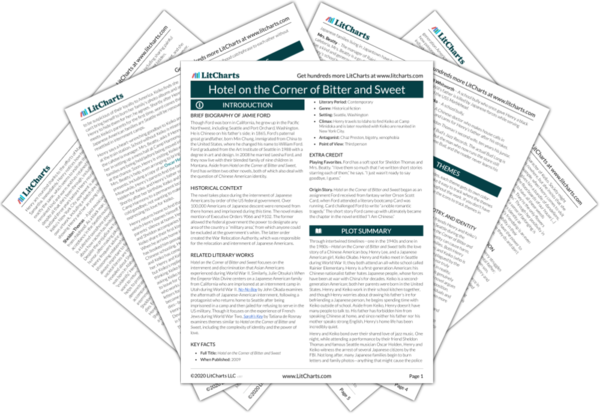Henry’s Father Quotes in Hotel on the Corner of Bitter and Sweet
Speak Your American (1942) Quotes
He listened to his father during these lopsided, one-way conversations, but he never talked back. In fact, Henry rarely talked at all, except in English to acknowledge his advancing skills. But since his father understood only Cantonese and a little Mandarin, the conversations came as waves, back and forth, tidal shores of separate oceans.
“Why do you like jazz so much?” Keiko asked.
“I don’t know,” Henry said. […] “Maybe because it’s so different, but people everywhere still like it, they just accept musicians, no matter what color they are. Plus, my father hates it.”
“Why does he hate it?”
“Because it’s too different, I guess.”
Executive Orders (1942) Quotes
His father had devoted most of his life to nationalist causes, all aimed at furthering the Three People’s Principles proclaimed by the late Chinese president. […] as Henry grasped the point of his father’s enthusiasm in these small local conflicts with Japanese Americans, it was mixed with a fair amount of confusion and contradiction. Father believed in a government of the people but was wary of who those people were.
Ume (1986) Quotes
But more than that, Henry hated being compared with his own father. In Marty’s eyes, the plum hadn’t fallen far from the tree; if anything, it was clinging stubbornly to the branches. That’s what I’ve taught him by my example, Henry thought.
Home Again (1942) Quotes
It made Keiko’s situation, while bleak, seem so much more appealing. Henry caught himself feeling a twinge of jealousy. At least she was with her family. For now anyway. At least they understood. At least they wouldn’t send her away.
Camp Anyway (1942) Quotes
“[My father]’s disowned me. My parents stopped speaking to me this week. But my mother still sort of acts like I’m around.” The words came out so casually, even Henry was surprised at how normal it felt. But communication in his home had been far from ordinary for almost a year; this was just a new, final wrinkle.
V-J Day (1945) Quotes
He’d wondered what his father would do to occupy his time now that the Japanese had surrendered. Then again, he knew the war would go on in his father’s mind. This time it would be the Kuomintang, the nationalists versus the communists. China’s struggle would continue, and so would his father’s.

Henry’s Father Quotes in Hotel on the Corner of Bitter and Sweet
Speak Your American (1942) Quotes
He listened to his father during these lopsided, one-way conversations, but he never talked back. In fact, Henry rarely talked at all, except in English to acknowledge his advancing skills. But since his father understood only Cantonese and a little Mandarin, the conversations came as waves, back and forth, tidal shores of separate oceans.
“Why do you like jazz so much?” Keiko asked.
“I don’t know,” Henry said. […] “Maybe because it’s so different, but people everywhere still like it, they just accept musicians, no matter what color they are. Plus, my father hates it.”
“Why does he hate it?”
“Because it’s too different, I guess.”
Executive Orders (1942) Quotes
His father had devoted most of his life to nationalist causes, all aimed at furthering the Three People’s Principles proclaimed by the late Chinese president. […] as Henry grasped the point of his father’s enthusiasm in these small local conflicts with Japanese Americans, it was mixed with a fair amount of confusion and contradiction. Father believed in a government of the people but was wary of who those people were.
Ume (1986) Quotes
But more than that, Henry hated being compared with his own father. In Marty’s eyes, the plum hadn’t fallen far from the tree; if anything, it was clinging stubbornly to the branches. That’s what I’ve taught him by my example, Henry thought.
Home Again (1942) Quotes
It made Keiko’s situation, while bleak, seem so much more appealing. Henry caught himself feeling a twinge of jealousy. At least she was with her family. For now anyway. At least they understood. At least they wouldn’t send her away.
Camp Anyway (1942) Quotes
“[My father]’s disowned me. My parents stopped speaking to me this week. But my mother still sort of acts like I’m around.” The words came out so casually, even Henry was surprised at how normal it felt. But communication in his home had been far from ordinary for almost a year; this was just a new, final wrinkle.
V-J Day (1945) Quotes
He’d wondered what his father would do to occupy his time now that the Japanese had surrendered. Then again, he knew the war would go on in his father’s mind. This time it would be the Kuomintang, the nationalists versus the communists. China’s struggle would continue, and so would his father’s.











